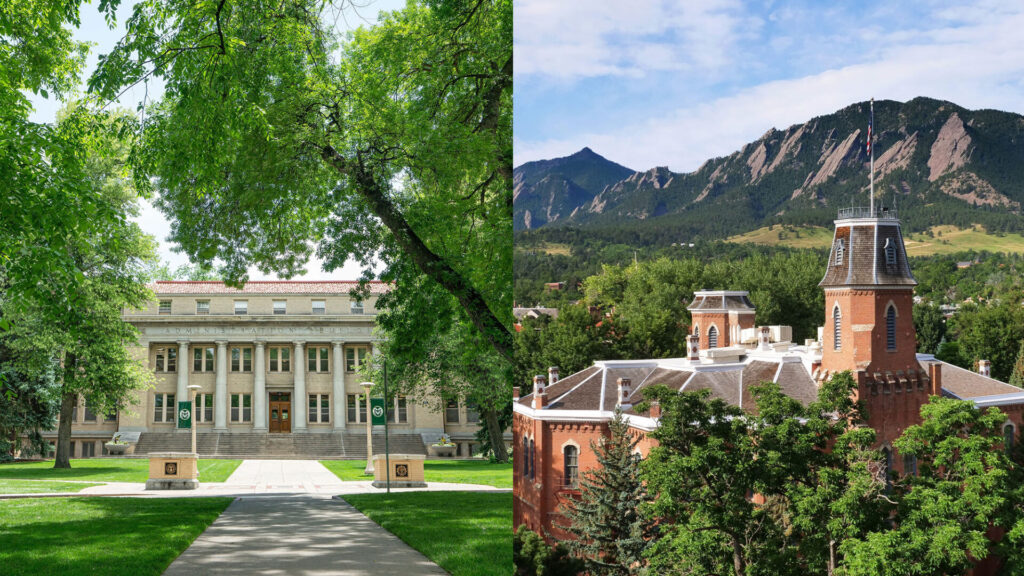Rocky Mountain Showdown: CSU v. CU 2023

While Rams and Buffs gear up for the biggest in-state football rivalry, the Rocky Mountain Showdown, on Sept. 16, it’s also a moment to reflect on the work both institutions do to solve global and local challenges.
Colorado State University and University of Colorado Boulder collaborate on research projects, with more than 1,900 co-authored articles and research that improves the lives of Coloradans and people around the world, and open access articles allowing researchers from across the globe to utilize this foundational work for the betterment of humanity.
The two institutions are equally vital to workforce development in Colorado and to the innovation ecosystem that leads to new industries and businesses.
CSU startup and spinoff companies generate about $228 million of regional economic impact annually, and the university has launched 50 startup companies since 2006 supporting more than 750 active inventions and accounting for hundreds of private-sector jobs in Colorado. Commercialization activities by CU Boulder had an economic impact of $8 billion nationally and $5.2 billion in the state of Colorado (2018-22).
The energy generated on the field also amplifies the exceptional partnership between the two flagship institutions in Colorado.
Fan Code of Conduct
Ram Pride means cheering on Colorado State with integrity – toward the Rams and their opponents. Colorado State University and CSU Athletics are committed to creating a safe, fun and enjoyable fan experience for everyone who attends a CSU event. All fans are expected to show respect, courtesy and sportsmanship before, during and after all games.
Code of Conduct Best Practices:
• Keep cheers positive.
• Show respect for student-athletes, coaches, game officials/referees and fellow fans.
• No foul language or gestures – don’t ruin the game for others.
• If you drink, do it legally and responsibly.
• Stay off the playing area and don’t throw anything onto the field.
• Whether you stand or sit, be respectful to those around you.
• Be a good sport, especially to visiting teams and their fans. Remember, you represent CSU!
• Show your Ram Pride before, during and after the game.

Ways to watch the big game!
Attending the game?
- Saturday, Sept. 16, 2023 @ 8 p.m.
- CSU @ CU (Folsom Field)
- Additional information and tickets
- Information about the CSU Tailgate at CU
Free Rams Watch Party at CSU’s Canvas Stadium!
- Free admission
- Canvas Stadium Gates open at 7:30 p.m.
- All fans enter through the North Gates
- New Belgium Porch and Lower East Sideline bleacher seats will be open
- Water, soft drinks, beer, and concessions for purchase
- Canvas Stadium clear bag policy and prohibited items apply
Opponents on the field; partners in impact
CU and CSU are two great research institutions that serve our state by educating students, fostering innovation through research and discovery, improving lives and driving our state’s economy. Below are examples of ways CSU and CU work together on research and ways the two institutions’ research connect to advance research in areas of impact.
Sustainability
Cropland management, compost key to combatting climate change
A longest-of-its-kind study, led by CSU analyzing 16 years of soil data, shares new insights on how applying organic waste to cropland can enhance carbon and nitrogen retention and reduce greenhouse gas emissions. Using a model developed at CSU, researchers quantified the optimal amount and timing of compost application to maximize carbon storage and plant production, while minimizing reliance on fertilizer.
The future of recycling could one day mean dissolving plastic with electricity
Chemists at CU Boulder have developed a new way to recycle a common type of plastic called polyethylene terephthalate (PET), which consumers encounter every day in water bottles, blister packs and even some polyester fabrics. In small-scale lab experiments, the researchers mixed bits of that plastic with a special kind of molecule then applied a small electric voltage. Within minutes, the PET began to disintegrate.
Trash to treasure: Renewable energy system could capture farm fertilizer runoff and recycle it
Colorado State University faculty members Reza Nazemi, Yan “Vivian” Li and John Mizia earned 2023 grants awarded by Colorado’s Advanced Industries. Two projects focus on turning agricultural waste into reusable material. The third strives to develop an LED photochemical vaccine manufacturing testbed.
Air
Breathe in, breathe out: Scientists continue probing chemistry of indoor air
Associate Professor Delphine Farmer, CSU atmospheric chemist and Marina Vance, an engineer at CU Boulder, led an innovative set of experiments this spring that probed the main drivers of indoor air chemistry and its complexity. Their experiment, called Chemical Assessment of Surfaces and Air, or CASA – was conducted alongside about 40 collaborators across 12 U.S. institutions.
LongPath Technologies secures Colorado approval for methane-emissions technology
LongPath Technologies Inc., a Boulder-based startup that builds laser systems to monitor methane emissions, has received regulatory approval for use of its system by the Colorado Department of Public Health & Environment. The approval makes LongPath the first emissions-monitoring technology approved by both CDPHE and the U.S. Environmental Protection Agency.
ARPA-E awards CSU $1.5 million to curb methane emissions in natural gas infrastructure
CSU Mechanical engineering Professor Daniel Olsen will lead a project to reduce methane emissions from the large engines that power natural gas compressors, under a $1.5 million grant from the Department of Energy’s Advanced Research Projects Agency, or ARPA-E. The grant is part of ARPA-E’s $35 million REMEDY program, targeting methane emissions in coal, oil, and gas industries.
Research partnerships
CO-WY engine chosen as finalist in new NSF innovation competition
CU Boulder is a founding partner of the CO-WY Engine, one of 16 finalists for the National Science Foundation’s inaugural “NSF Regional Innovation Engines” competition, which could net winners $160 million over 10 years. The CO-WY Engine’s grant proposal is focused on fostering a regional innovation ecosystem of cutting-edge products and services that takes on societal and economic challenges.
CU professor treks to the top of the world to share wildlife/climate message
Joanna Lambert delivered the Inaugural Everest Address on Wildlife and Climate at the World’s Highest Climate Summit in Nepal to a small group of guides, scientists, and filmmakers at Mount Everest’s historic South Base Camp. Lambert was joined by CSU’s Joel Berger, who led a presentation on Nepal’s legacy on biodiversity, focusing on snow leopards and wild yaks.
How to lower carbon levels using light
As a Ph.D. student and postdoctoral fellow at CU Boulder, Chern-Hooi Lim used a supercomputer to model how well various organic photocatalysts would absorb light and transfer electrons to stimulate particular chemical reactions. He took his findings to Garret Miyake, an organic chemist at CSU, who synthesized and tested them. On the basis of their results, they launched New Iridium, which has been longlisted for The Spinoff Prize 2023.
CSU & CU impact of research
Excerpt from OpEd with CSU President Amy Parsons and CU Chancellor Philip DiStefano
In many households across Colorado, this week is all about Ralphie versus CAM the Ram. The rest of the year, however, Ralphie and CAM are more partners than rivals, as our universities work together to advance our state and develop solutions to society’s most difficult problems.
Colorado State University and the University of Colorado Boulder team up each day to serve Colorado through groundbreaking research and exceptional education that sustain our state’s economy, health, climate and quality of life.
Opening doors to students
Excerpt from OpEd with CSU System Chancellor Tony Frank and CU System President Todd Saliman
This weekend marks the return of what is arguably Colorado’s greatest college rivalry: the Rocky Mountain Showdown between our state’s largest public research universities, Colorado State and the University of Colorado. While football is in the spotlight this weekend, the occasion allows us to celebrate all that CU and CSU have to offer our great state year-round.
It also provides us a chance to showcase Colorado’s rich higher education ecosystem overall, which offers affordable, accessible opportunities for anyone who wants to improve their lives through learning.
